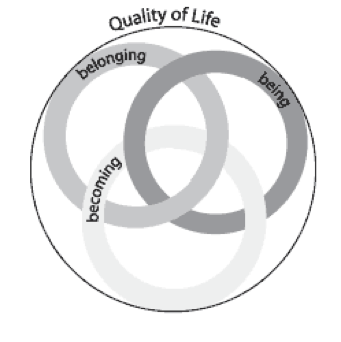
The Quality of Life Research Unit
About the QOLRU
Dr. Renwick has focused on learning about quality of life for individuals with disabilities. The study of quality of life (QOL) is learning about people’s happiness and well-being. From our perspective, the goal of a quality of life study is to help people to live quality lives. This means lives that are meaningful and enjoyed. Through research, we define QOL as: The degree to which a person enjoys the important possibilities of his or her life.
About Quality of Life
Quality of Life is an area of study that is of particular interest to disciplines such as health, rehabilitation, disabilities studies, and social services, but also in medicine, education, and others. The Department of Occupational Science and Occupational Therapy (in partnership with the Centre for Health Promotion) at the University of Toronto, has carried out quality of life research to develop conceptual models and instruments for research, evaluation, and assessment at the Quality of Life Research Unit since 1991. Much of our research focus is on the quality of life of those who are most vulnerable, including people with IDD, children with long-term developmental delays, and seniors. Our most current interest lies in youth and young adults with IDD, which is how the VOY and P2B research projects emerged.
Visit the http://sites.utoronto.ca/qol/, the Quality of Life Research Unit’s website for further details of our Quality of Life model (Figure 1), past projects, instruments, reports, manuals, and other publications developed through our research.

